Editor:
Brandon Sweet
University Communications
bulletin@uwaterloo.ca
Waterloo Region invests in cutting edge eye and vision care
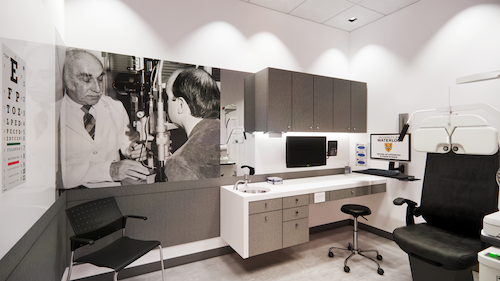
The University of Waterloo's School of Optometry and Vision Science is announcing a $1 million partnership with the Region of Waterloo, expanding community members' access to world-class eye and vision care.
Located within the University of Waterloo's School of Optometry and Vision Science, the new Waterloo Eye Institute will expand the delivery of essential eye and vision care, such as comprehensive eye exams, low vision rehabilitation services, dry eye disease treatment and myopia control, in 67,000 square feet of new and renovated space.
Already one of the largest vision care facilities in Canada, the University of Waterloo Optometry Clinic is open to all members of the public and currently averages over 28,000 patient interactions per year. With increased clinical capacity, the Waterloo Eye Institute aims to double the amount of comprehensive and specialized care delivered to patients of all ages and abilities annually - including access to care in areas of growing demand such as vision therapy, ocular disease, and concussion.
"When I'm asked to identify some of the differentiators that make our Region great, I often think of the School of Optometry and Vision Science," says Councillor Michael Harris. "Whether you're young, middle-aged, or a senior, people of all ages receive high-quality care at the University of Waterloo. And as one of the fastest-growing regions in Ontario, access to high-quality eye and vision care has never been more important."
In addition to enhanced access to care, the Waterloo Eye Institute will include the largest vision science research hub in North America, bringing together under one roof the University's expertise in imaging, artificial intelligence, vision science and brain health, to bring new treatments from the lab directly to patients. The Waterloo Eye Institute will also unveil a national tele-optometry centre, bridging critical access to eye and vision care for remote and Indigenous communities across the country.
This partnership with the Region of Waterloo comes as Canadians feel the impact of a growing vision crisis, says Dr. Carol Cressman, a local optometrist and chair of the School's Waterloo Eye Institute community fundraising campaign.
"Poor vision can severely impact a person's quality of life," Cressman said. "It is startling to know that one in five Canadians are already at risk of losing their sight due to eye disease, and that it's expected this figure will double in the next thirty years."
Councillor Sean Strickland agrees. "The need is there to bring a world-class eye and vision care centre to our local community, so people like me, and thousands of others, can get the care they need here at home instead of travelling outside the Region," Strickland said.
Thanks to the community's generosity and University support, Waterloo's School of Optometry and Vision Science has raised $18.1 million of its $35 million Seeing Beyond 2020 fundraising campaign and is on track to see the Waterloo Eye Institute break ground in 2023.
For more information, please visit the Seeing Beyond 2020 website.
Finding the branches on the tree of life
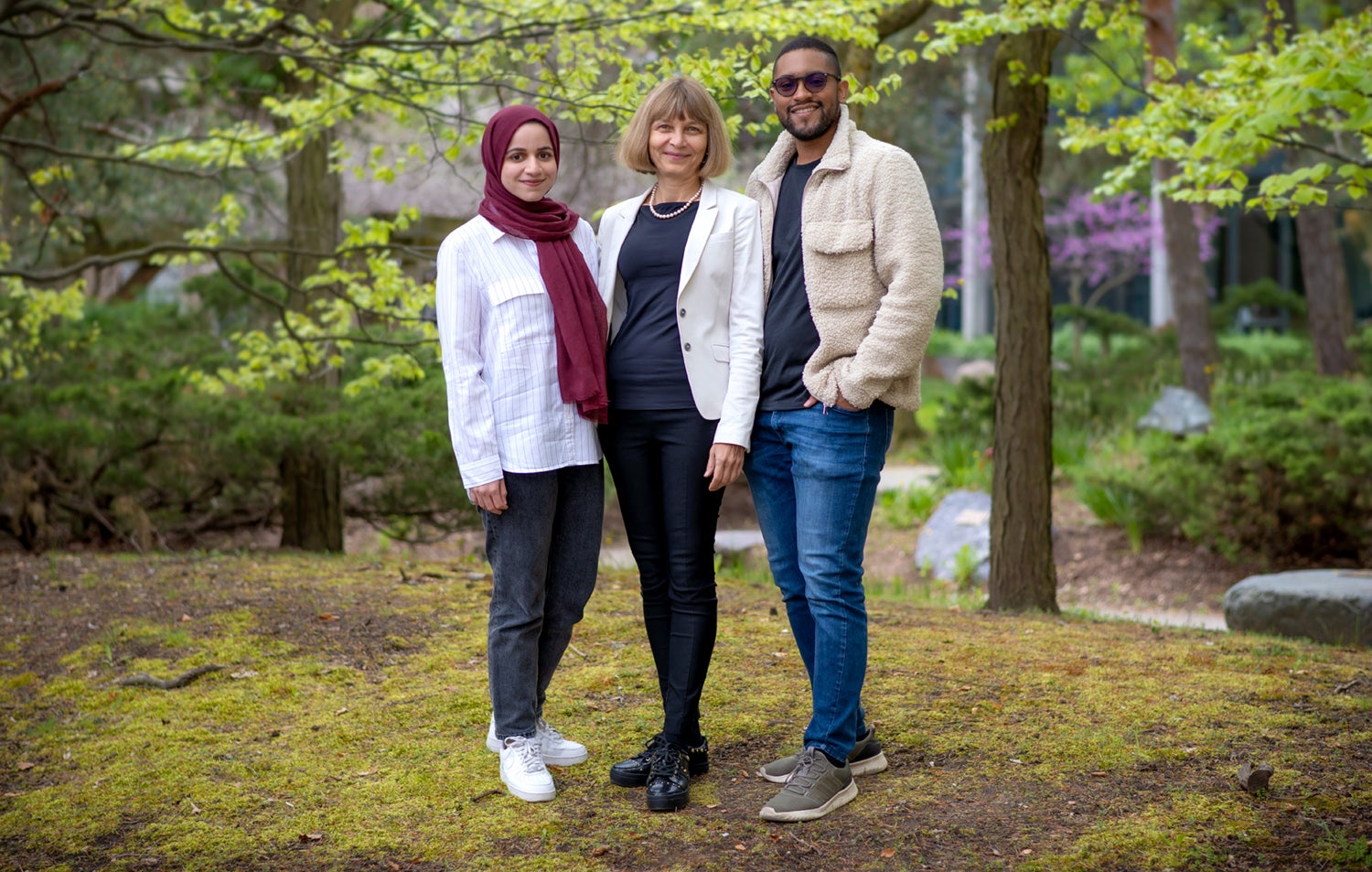
PhD student Fatemeh Alipour, Professor Lila Kari and PhD student Pablo Millán Arias. Professor Kathleen Hill from Western University was unavailable for the photo.
This is an excerpt of an article originally published on Waterloo News.
In On the Origin of Species, Charles Darwin described the evolutionary relationships between organisms as branches on a tree, a diagrammatic representation of all species that have ever existed connected by common descent.
"The affinities of all the beings of the same class have sometimes been represented by a great tree," Darwin wrote in On the Origin of Species. "I believe this simile largely speaks the truth. The green and budding twigs may represent existing species; and those produced during each former year may represent the long succession of extinct species."
The metaphor has served biologists well, but reconstructing the tree of life’s many limbs, branches and twigs has not been straightforward. Evolutionary relationships between organisms thought to be true for decades have been overturned as new techniques using molecular biology coupled with computer science have been developed.
One such method — Deep Learning for Unsupervised Clustering of DNA Sequences, or DeLUCS for short — pioneered by Cheriton School of Computer Science Professor Lila Kari, her PhD students Pablo Millán Arias and Fatemeh Alipour, and her colleague Professor Kathleen Hill at Western University’s Department of Biology uses unsupervised machine learning to determine taxonomic relationships between organisms.
Fatemeh’s research interests are in DNA sequence classification using alignment-free methods with applications for virus–host co-evolution. Pablo Millán Arias’s research interests span DNA classification to computer vision and image pattern recognition to theoretical computer science. Lila Kari is a Professor and University Research Chair in the Cheriton School of Computer Science. Author of more than 200 peer-reviewed articles, she is regarded as one of the world’s experts in biomolecular computation — using biological, chemical and other natural systems to perform computations.
“The evolutionary relationships that DeLUCS determines match true taxonomic groups with very high accuracy, ranging from 77 per cent right up to 100 per cent across a range of genetic datasets from organisms as diverse as vertebrates, bacteria and viruses,” Professor Kari said.
But before the computational method that DeLUCS uses to determine relationships can be understood, the structure of DNA and how genomic data is processed by computers needs to be described.
DNA is a molecule inside cells that contains the genetic information for the development and functioning of an organism. DNA is a double-helix polymer, a long spiral molecule consisting of two DNA strands wound around each other. Each strand has a backbone made of alternating sugar molecules called deoxyribose and phosphate groups. Attached to this backbone are sequences of four bases — molecules known as adenine (A), cytosine (C), guanine (G) or thymine (T). The sequence of these bases along the backbone encodes information, the instructions the cell uses to make protein molecules that carry out the functions of life.

DNA is a double-helix molecule formed by base pairs (adenine and thymine depicted in blue, guanine and cytosine depicted in orange) attached to a sugar-phosphate backbone (in grey).
One way to represent the one-dimensional sequence of bases in DNA graphically is to plot them using a technique known as chaos game representation or CGR.
“The idea of CGR is to represent a DNA sequence as an image,” Professor Kari explains. “You start with a unit square with the corners labelled by the four bases: C G A T. The first pixel in the image is in the centre. The DNA sequence is read from left to right, and for each base that is read a new pixel is plotted halfway on the segment determined by the current pixel and the corner labelled by the next DNA letter being read.”
Read the rest of the article on the Computer Science website.
Becoming who I aspired to be
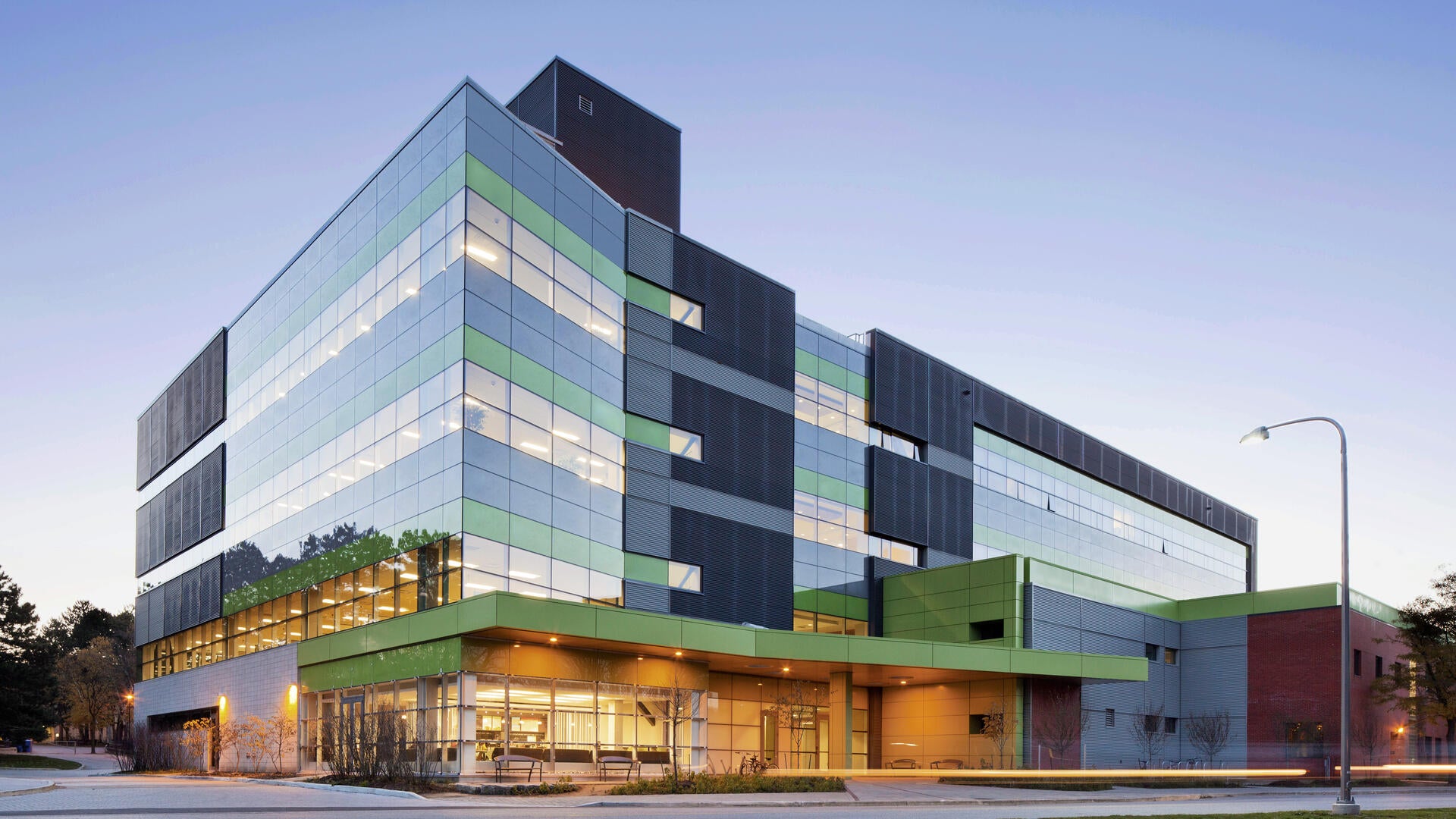
By Sierra Vowels. This article was originally published on Waterloo News.
The end of every academic year is an opportunity for students at Waterloo to bid farewell as they move on with optimism to explore life after school. For some, the experiences they had during their program will shape the life they lead after graduation.
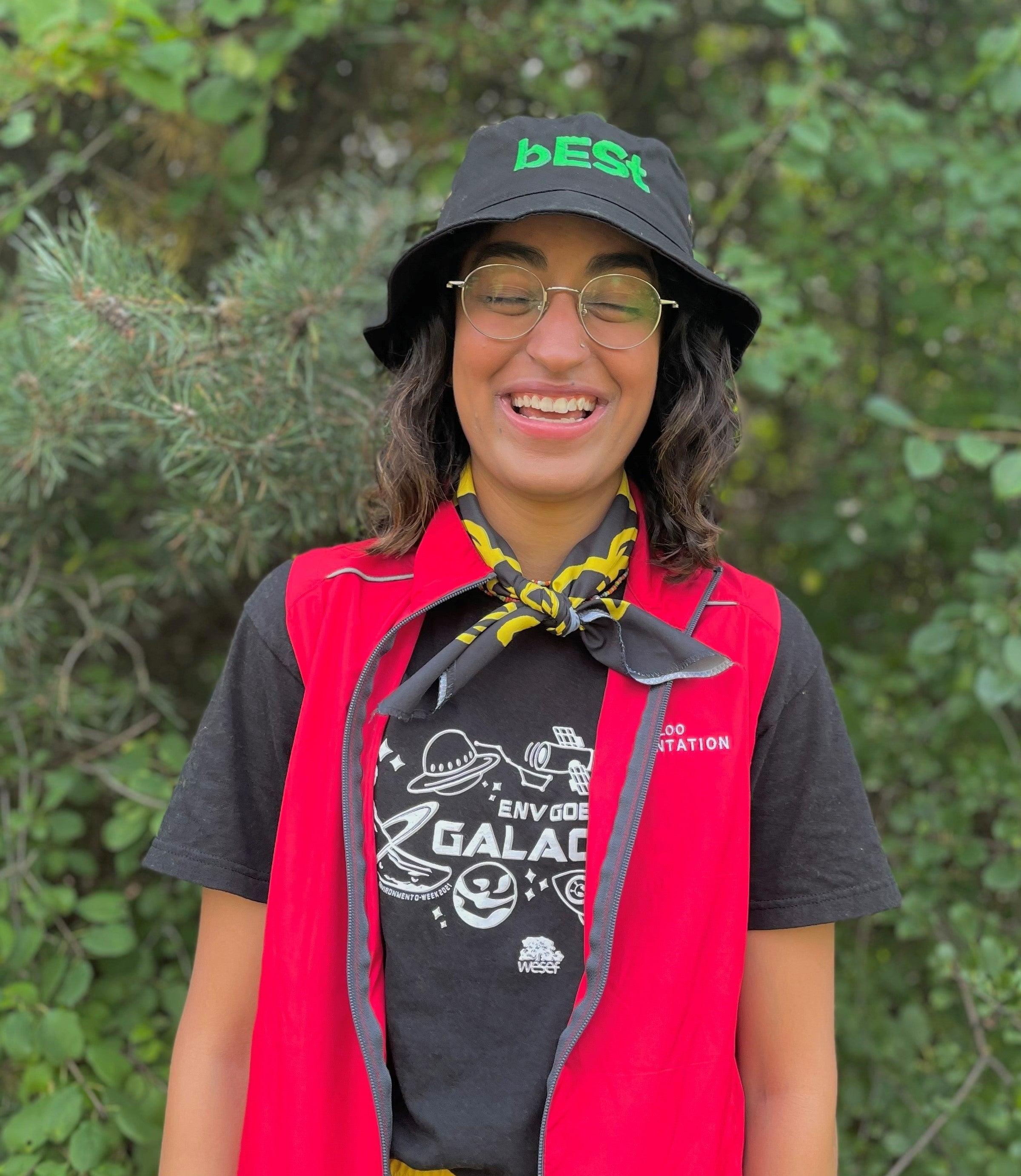
For Nashmia Aamir, a student of International Development in the Faculty of Environment graduating with her class in June of 2022, the experience will stay with her for a lifetime.
Aamir accomplished a lot as an undergraduate student at Waterloo. She was the co-president of the Student Association of International Development, vice president of Finance, Environment Ambassador, Environment Orientation team member and much more.
As she graduates from the University of Waterloo, she discusses some of her experiences and passes on some wisdom to current and incoming students.
What is the most influential lesson you learned at the University of Waterloo?
The most influential lesson I have learned at the University of Waterloo is that I am so much more capable than I ever thought I was. As someone who was shy and quiet for most of my life, the University gave me an outlet to truly be myself and be open to all possibilities. There is an opportunity for you to become who you always wanted to be. I learned to experience things that I have always been terrified to do and break the barriers that I have put on myself. Giving yourself a chance is what the University of Waterloo taught me in my 4 years here. The lessons learned here helped me become my best self and the person I always aspired to be.
What was your favourite course during your undergrad?
My favourite course of my undergrad is probably INDEV 387: Global Cities in Global Development, taught by Professor Cameron McCordic. Despite it being taught online, McCordic created such an interactive and informative environment through professional video lectures as well as discussion times called “Coffee with Prof. Cam”. It solidified connections with other students and encouraged discussions about the challenges faced due to urban development in a casual but interesting manner. This course made me fall in love with learning about these challenges that led me to focus my 4th year Honours International Development Thesis around urban development and women's rights in my hometown of Karachi, with Prof. McCordic as my thesis advisor.
Do you have any advice for incoming undergraduate students?
The advice I would give to the incoming undergraduate students is to not doubt yourself and take on the opportunities that come your way. You will get to meet so many wonderful people who you will eventually get to call your family if you join clubs and societies. It is easy to fall into self-doubt, but I promise you that once you embark on this journey, you will realise it is worth it. I would also like to remind you, that it is going to feel like all the time has flown by but somehow that no time has passed at all. You will look back and see all that you have achieved, all the people you have met, and it will be clear how much you have changed and how far you have come. So do not be afraid to make the most of it.
What are your plans after Waterloo?
I am embarking on my future endeavours. I am currently working with the Waterloo Undergraduate Student Association (WUSA) as the Orientation Programs Assistant due to the love and admiration I have for Orientation Week. I plan on working full time for a while to gain some experience before I set on to start grad school. I hope to do a Master’s in Urban Planning so that I can broaden my knowledge and dig deeper into my undergraduate thesis, Government corruption, water mafia, and informal settlements: A trickle-down effect on women in Orangi Town, Karachi. I hope to be a positive influence on those around me and to inspire those that come after me.
A lineup of events for National Indigenous History Month
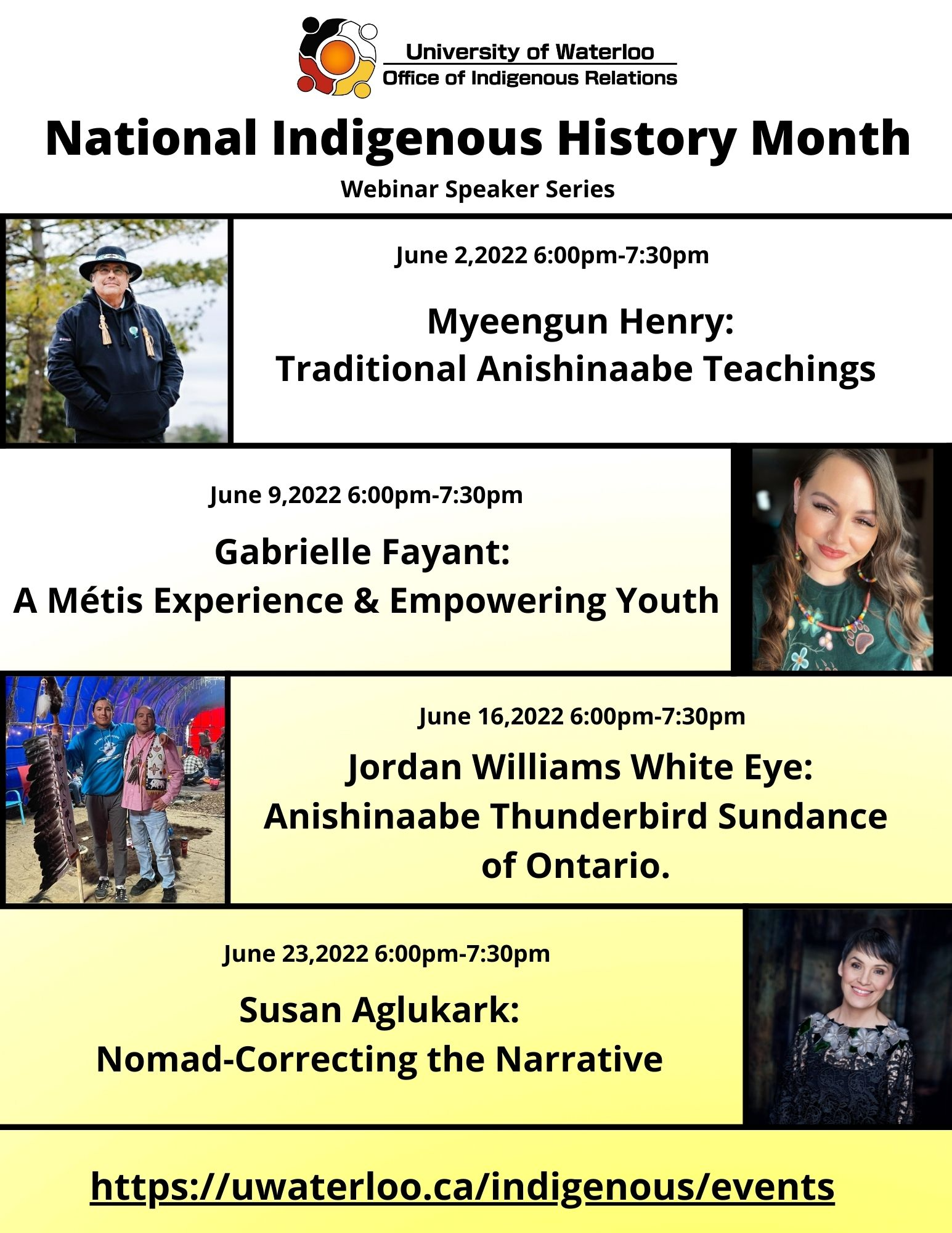
June is National Indigenous History Month. “We are overjoyed to have the privilege of hosting so many amazing speakers this June," says a note from the Office of Indigenous Relations. "In celebration of National Indigenous History Month, we invite you all to come learn with us. Through learning, we continue the process of decolonization."
Events include:
-
Myeengun Henry: Traditional Anishinaabe Teachings, Thursday, June 2 at 6:00 p.m.;
-
Gabrielle Fayant: A Métis Experience & Empowering Youth, Thursday, June 9 at 6:00 p.m.;
-
Jordan Williams White Eye: Anishinaabe Thunderbird Sundance of Ontario, Thursday, June 16 at 6:00 p.m.;
-
Susan Aglukark: Nomad-Correcting the Narrative, Thursday, June 23 at 6:00 p.m.
"All events take place on Zoom," the Office of Indigenous Relations reports. "Everyone is welcome and encouraged.”
UW WELL-Fit celebrates 20 years with BBQ; other notes
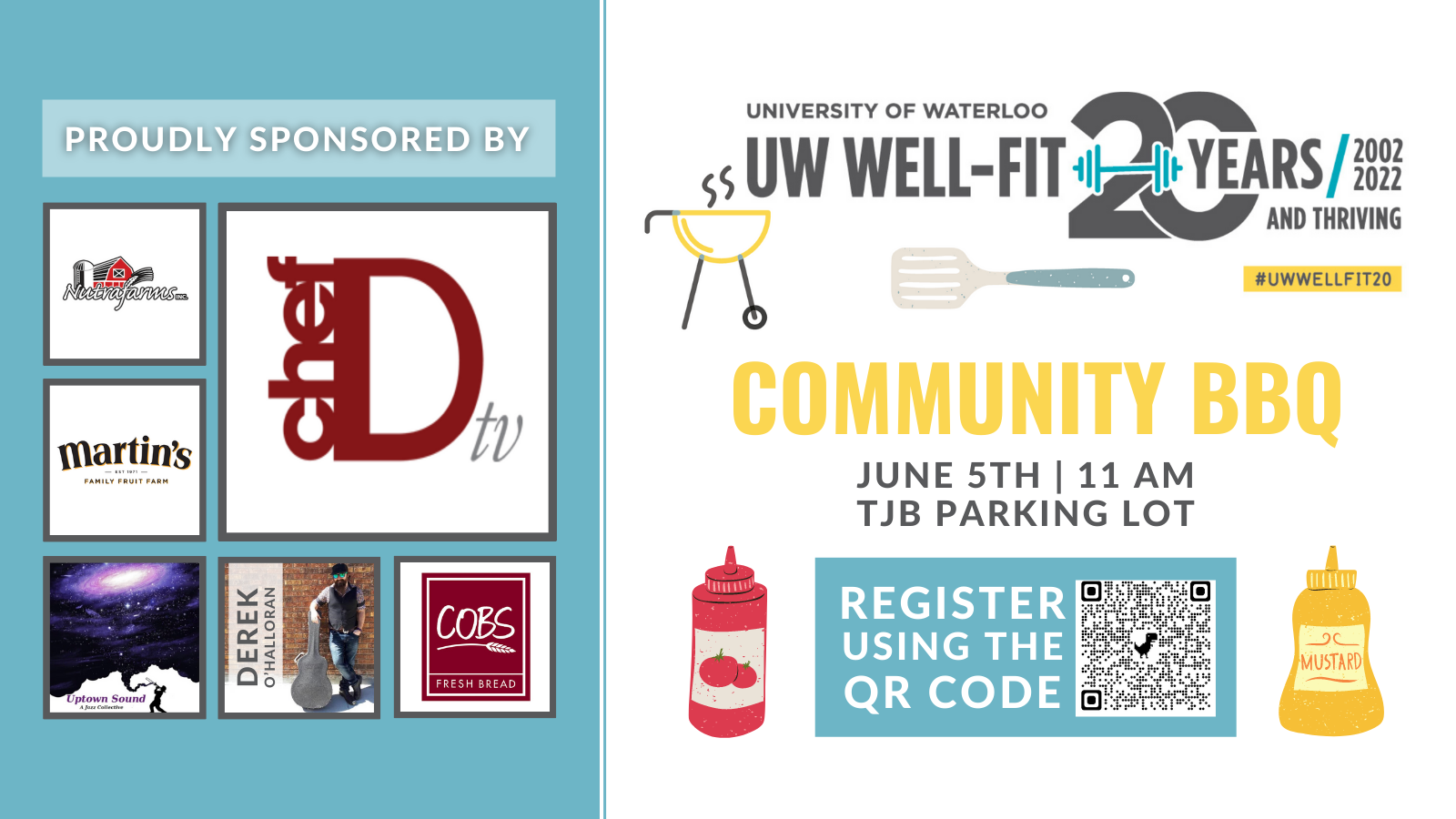
The Centre for Community, Clinical and Applied Research Excellence (CCCARE) is hosting a celebratory barbecue and open house event to mark UW WELL-Fit's 20th anniversary. "UW WELL-Fit is celebrating 20 years with a community BBQ and open house at the Toby Jenkins Applied Research Building (CCCARE)," says the note from CCCARE. "Register to join us on Sunday, June 5 from 11:00 a.m. to 3:00 p.m. for food, music, and family fun."
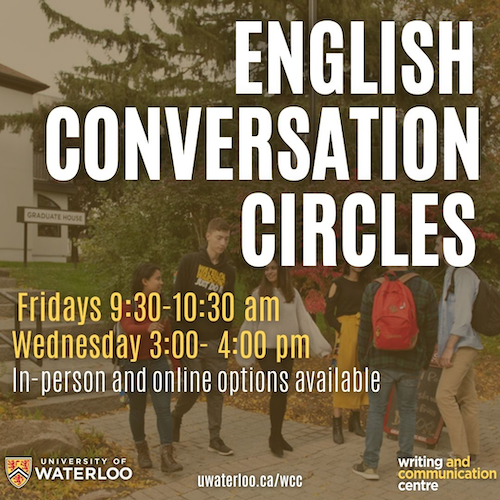
Join the conversation. "Make new friends and catch up with old ones at the English Conversation Circles," says a note from the Writing and Communication Centre (WCC). "In-person Wednesdays 3:00 p.m. to 4:00 p.m. and online Fridays 9:30 a.m. to 10:30 a.m. Follow the link to sign up today.

There's still time to register for the 30th Annual Matthews Golf Classic, which will be held on Monday, June 6 at the Grand Valley Golf & Country Club in Cambridge. Prices are as follows:
- $95 for Golf, Cart, Boxed Lunch and Dinner; and
- $60 for Golf, Cart, and Boxed Lunch.
Registration and check-in starts at 12 noon and runs to 12:50 p.m., with a shotgun start at 1:00 p.m. Dinner will be served at approximately 6:00 p.m. Contact jim.howard@uwaterloo.ca for further information.
Link of the day
When and Where to get support
Students can visit the Student Success Office online for supports including academic development, international student resources, immigration consulting, leadership development, exchange and study abroad, and opportunities to get involved.
Instructors looking for targeted support for developing online components for blended learning courses, transitioning remote to fully online courses, revising current online courses, and more please visit Agile Development | Centre for Extended Learning | University of Waterloo (uwaterloo.ca).
Instructors can visit the Keep Learning website to get support on adapting their teaching and learning plans for an online environment.
Course templates are available within your course in LEARN to help you build and edit your content and assignment pages quickly.
The following workshops, webinars, and events are offered by the KL team (CTE, CEL, ITMS, LIB):
-
Scholarship of Teaching and Learning (SoTL) Methods – self-directed, continuous self-enrollment course in LEARN.
-
Independent Blended Course Design (iBlend) - self-directed, continuous self-enrollment course in LEARN.
-
Copyright Overview for Waterloo Instructors and Staff - self-directed, continuous self-enrollment course in LEARN.
-
Independent Remote Course Design Essentials (iReCoDE)- self-directed, continuous self-enrollment course in LEARN.
-
Supporting Student Mental Health (for Instructors) – self-directed, continuous self-enrollment course in LEARN.
-
PebblePad Users Group (CTE7526), Thursday, June 2, 1:00 p.m. to 2:30 p.m.
-
SoTL Stories, June 15, 1:00 p.m. to 2:00 p.m.
Supports are available for employees returning to campus. Visit IST’s Hybrid Work and Technology guidelines and workplace protocols to assist with the transition.
The Writing and Communication Centre has virtual services and programs to help undergrads, grad students, postdocs and faculty members with academic writing.
- Meet with writing advisors in one-to-one appointments to brainstorm, draft, revise, and polish. No time for an appointment? Try email tutoring for undergrads.
- Beat isolation and make writing progress at weekly Virtual Writing Cafés for grad students and faculty or PJ-Friendly Writing Groups for Undergrads.
- Take an online workshop or apply to our popular Dissertation Boot Camp program.
- Faculty can request custom in-class workshops for their courses, or the WCC can facilitate any existing workshops for student groups.
- Course-integrated support available. Attention faculty and instructors: The application form for Writing and Communication Centre course-integrated support is now available online. We offer five unique support streams for your courses including synchronous and asynchronous workshops and monitored discussion boards.
Co-op students can get help finding a job and find supports to successfully work remotely, develop new skills, access wellness and career information, and contact a co-op or career advisor.
The Centre for Career Action (CCA) has services and programs to support undergrads, grad students, postdocs, alumni, and employees in figuring out what they value, what they’re good at, and how to access meaningful work, co-op, volunteer, or graduate/professional school opportunities. Questions about CCA's services? Live chat, call 519-888-4047, or stop by our front desk in the Tatham Centre 8:30 a.m. to 4:30 p.m., Monday to Friday.
Drop-in to Warrior Virtual Study Halls on Wednesdays from 5:30 p.m. to 7:00 p.m. Come together in this virtual space to set goals and work independently or in groups each week.
Renison's English Language Institute continues to offer virtual events and workshops to help students practice their English language skills.
If you feel overwhelmed or anxious and need to talk to somebody, please contact the University’s Campus Wellness services, either Health Services or Counselling Services. You can also contact the University's Centre for Mental Health Research and Treatment. Good2Talk is a post-secondary student helpline available to all students.
The Library is open with expanded hours for access to book stacks, drop-in individual study space, bookable group study rooms, drop-in access to computers and printers, book pick-up services and IST Help Desk support. Librarian consultations, Special Collections & Archives and the Geospatial Centre are available by appointment. Full details on current services and hours are available on the Library’s COVID-19 Update webpage.
The Faculty Association of the University of Waterloo (FAUW) continues to advocate for its members. Check out the FAUW blog for more information.
The University of Waterloo Staff Association (UWSA) continues to advocate for its members. Check out the UWSA blog for more information.
The Sexual Violence Prevention and Response Office (SVPRO) supports all members of the University of Waterloo campus community who have experienced, or been impacted, by sexual violence. This includes all students, staff, faculty and visitors on the main campus, the satellite campuses, and at the affiliated and federated Waterloo Institutes and Colleges. For support, email: svpro@uwaterloo.ca or visit the SVPRO website.
The Office of Indigenous Relations is a central hub that provides guidance, support, and resources to all Indigenous and non-Indigenous campus community members and oversees the University's Indigenization strategy.
The Waterloo Indigenous Student Centre, based at St. Paul’s University College, provides support and resources for Indigenous students, and educational outreach programs for the broader community, including lectures, and events.
WUSA supports for students:
Peer support - MATES, Glow Centre, RAISE, Women’s Centre - Visit https://wusa.ca/services/wusa-peer-support to book an appointment either in person or online for the Fall term.
Food Support Service food hampers are currently available from the Turnkey Desk 24/7 in the Student Life Centre. Drop off locations are also open again in SLC, DC, DP, SCH and all residences.
Co-op Connection all available online. Check https://wusa.ca for more details.
Centre for Academic Policy Support - CAPS is here to assist Waterloo undergraduates throughout their experience in navigating academic policy in the instances of filing petitions, grievances and appeals. Please contact them at caps@wusa.ca. More information is available.
WUSA Student Legal Protection Program - Seeking legal counsel can be intimidating, especially if it’s your first time facing a legal issue. The legal assistance helpline provides quick access to legal advice in any area of law, including criminal. Just call 1-833-202-4571.
Empower Me is a confidential mental health and wellness service that connects students with qualified counsellors 24/7. They can be reached at 1-833-628-5589.
GSA-UW supports for graduate students:
The Graduate Student Association (GSA-UW) supports students’ academic and social experience and promotes their well-being.
Advising and Support - The GSA advises graduate students experiencing challenges and can help with navigating university policies & filing a grievance, appeal, or petition.
Mental Health covered by the Health Plan - The GSA Health Plan now has an 80 per cent coverage rate (up to $800/year) for Mental Health Practitioners. Your plan includes coverage for psychologists, registered social workers, psychotherapists, and clinical counselors.
Dental Care - The GSA Dental Plan covers 60 to 70 per cent of your dental costs and by visiting dental professionals who are members of the Studentcare Networks, you can receive an additional 20 to 30 per cent coverage.
Student Legal Protection Program - Your GSA fees give you access to unlimited legal advice, accessible via a toll-free helpline: +1-833-202-4571. This advice covers topics including housing disputes, employment disputes, and disputes with an academic institution.
The Graduate House: Open Monday to Tuesday 11:30 a.m. to 7:00 p.m. and Wednesday to Friday 11:30 a.m. to 9:00 p.m. We’re open to all students, faculty, staff, and community members. The Graduate House is a community space run by the GSA-UW. We’re adding new items to the menu. Graduate students who paid their fees can get discounts and free coffee.
When and Where (but mostly when)
Warriors vs. Laurier Blood Donation Battle. Join our “Waterloo Warriors” team on the Blood.ca website or app. #ItsInYouToGive
Equity and inclusion in industry sponsored contract research and commercialization consultations for researchers, Monday, May 9 to Friday, June 3. Sign up for an interview timeslot.
National AccessAbility Week 2022, Sunday, May 29 to Saturday, June 4.
UW Staff Board Foundations workshop, Wednesday, June 1, 4:00 p.m., Microsoft Teams, Register for Session 002.
Interviewing for Insight, Thursday, June 2, 5:30 p.m.
Alumni Weekend, Saturday, June 4, 9:00 a.m. to 9:00 p.m.
Paint Brubacher House!, Brubacher House Artist-in-Residence Workshops with Yulia Balobanova, Saturday, June 4, 3:30 p.m., BRH (Brubacher House, North Campus UW).
TD Walter Bean Visiting Professorship: faculty & graduate student meetings, Monday, June 6 to Friday, June 10.
“Moving Forward by Slowing Down: Considering Diverse Perspectives on Drug Decriminalization and Legalization,” in person or online for the Waterloo community (online for the general public). Tuesday, June 7, 1:00 p.m. to 3:30 p.m. Keynote: Dr. João Goulão, Ministry of Health, Portugal. Followed by a panel moderated by Globe and Mail journalist André Picard.
Master of Taxation Virtual Information Session, Wednesday, June 8, 4:00 p.m.
CPI Talk: Digital Disinformation and Democracy, Wednesday, June 8, 6:30 p.m., Zoom.
Building Respectful Research Relationships with Indigenous Communities Webinar, Indigenous History Month 2022, Thursday, June 9, 12:00 p.m.
Positions available
On this week's list from the human resources department, viewable on the UWaterloo Talent Acquisition System (iCIMS):
- Job ID# 2022-8148 - Research Equity Advisor - Vice President, Research and International, USG 10
- Job ID# 2022-8567 - Payroll Manager - Human Resources, USG 12
- Job ID# 2022-8336 - Counsellor - Black Student Support - Campus Wellness, USG 10 – 13
- Job ID# 2022-8489 - Administrative Assistant to the Chair - Combinatorics & Optimization, USG 5
- Job ID# 2022-8505 - Undergraduate Coordinator - Math Undergraduate Office, USG 5 – 6
- Job ID# 2022-8517 - Administrative Coordinator, Undergraduate - Applied Mathematics, USG 5
- Job ID# 2022-8541 - Client Service Representative - Campus Wellness Administration, USG 5
- Job ID# 2022-8503 - Account Coordinator - CEE - Co-operative Education, USG 5 – 8
- Job ID# 2022-8508 - Administrative Support Coordinator - School of Optometry & Vision Science, USG 5
- Job ID# 2022-8514 - Systems Integration Specialist (Security Operations) – IST, USG 9 – 11
- Job ID# 2022-8520 - Manager, Centre for Career Action - CEE - Centre for Career Action, USG 12
- Job ID# 2021-6498 - Educational Developer, Anti-racist Pedagogies - Centre for Teaching Excellence, USG 11
- Job ID# 2022-8523 - Administrative Coordinator and Advisor, Undergraduate Studies – Psychology, USG 6
- Job ID# 2022-8499 - Lab Technician - Mechanical & Mechatronics Engineering, USG 7
- Job ID# 2022-8532 - SHARCNET Systems Administrator – Networking Specialist 5477 , USG 11
- Job ID# 2022-8513 - Senior Alumni Officer – Advancement, USG 10 – 11
- Job ID# 2022-8533 – Cook - Food Services, CUPE
- Job ID# 2022-8534 – Cook - Food Services, CUPE
- Job ID# 2022-8535 - Apprentice Cook - Food Services, CUPE
- Job ID# 2022-8582 - Executive Assistant - Advancement Strategy, USG 7
Secondments/Internal temporary opportunities
- Job ID# 2022-8560 - Research Equity Advisor - Office of Research, USG 10
- Job ID# 2022-8488 - Occupational Health Nurse - Campus Wellness, USG 10
- Job ID# 2022-8494 - Student Advisor - Central West Region - CEE - Co-operative Education, USG 8 – 9
- Job ID# 2022-8521 - CTE Faculty Liaison - Faculty of Health - Centre for Teaching Excellence, USG 9 – 11
- Job ID# 2022-8522 - Operations and Strategic Initiatives Coordinator - Institute for Quantum Computing, USG 6
- Job ID# 2022-8555 - Grants and Contracts Manager (Funding Agencies and Non-profit Sponsors) - Office of Research, USG 9 – 11
- Job ID# 2022-8527 - Development Officer, Annual Giving - Office of Advancement, USG 9 - 9
Affiliated and Federated Institutions of Waterloo opportunities